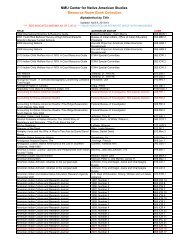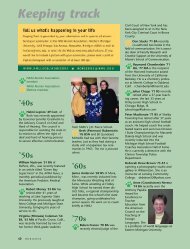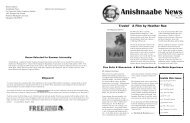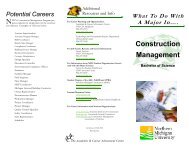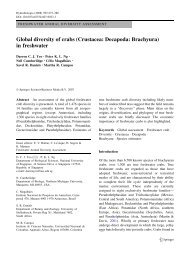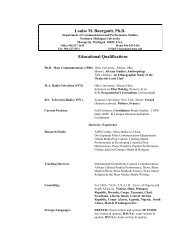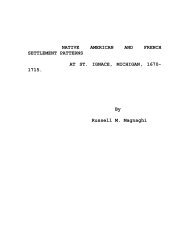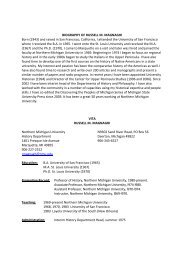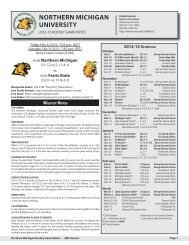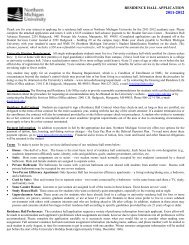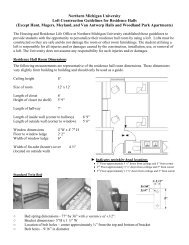Teacher Stress
Teacher Stress
Teacher Stress
Create successful ePaper yourself
Turn your PDF publications into a flip-book with our unique Google optimized e-Paper software.
<strong>Teacher</strong> <strong>Stress</strong>: The Search for Accurate View and Remedies that Work<br />
Ruth Reese<br />
Arizona State University West<br />
College of Education<br />
PO Box 37100<br />
Phoenix, Arizona 85069<br />
Ruth.Reese@asu.edu
Abstract<br />
In large numbers, teachers are reporting high levels of work-related stress.<br />
Surveys from many countries reveal widespread concern about the effects of stress on<br />
teachers’ well-being and willingness to stay in the profession. Much of the literature on<br />
teacher stress has major limitations; for example it tends to be dominated by one-time,<br />
self-report questionnaires that yield superficial or incomplete data.<br />
Renowned stress researchers such as Richard Lazarus and Susan Folkman<br />
recommend that stress be viewed as an interactive relationship between the person and<br />
the environment. This complex relationship requires that stress researchers employ more<br />
holistic, process methods. This paper explores how these qualitative methods can be used<br />
to conduct teacher stress studies that are reasonable to implement and likely to result in<br />
useful recommendations for helping teachers reduce stress.<br />
2
Large numbers of teachers report high levels of stress (Jarvis, 2002). This<br />
purpose of this paper is to reflect on a search for a more accurate picture of<br />
teacher stress and effective coping strategies. Worldwide surveys reveal<br />
widespread concern about the effects of stress on teachers’ sense of well-being<br />
and their willingness to stay in the profession. Compared to the general<br />
population, teachers are at risk for higher levels of psychological distress and<br />
lower levels of job satisfaction (Travers and Cooper, 1993; Schonfield, 1990).<br />
Borg (1990) reports that up to one third of teachers perceive their occupation as<br />
highly stressful. In the United States, thirty-nine percent of teachers leave the<br />
profession in the first five years (Department of Education’s Staffing and<br />
Schooling Survey, cited in Ingersoll, 2001a). <strong>Teacher</strong> stress can lead to alienation,<br />
apathy and absenteeism and eventually interfere with student achievement<br />
(Guglielmi and Tatrow, 1998). On a personal level teacher stress can affect heath,<br />
well-being and performance (Larchick and Chance, 2002).<br />
<strong>Teacher</strong> Shortage Problem: Recruitment or Retention<br />
After examining national and state efforts to recruit new teachers, Merrow<br />
(1999) concluded that the teacher shortage problem has been misdiagnosed. He<br />
strongly asserts that the problem is not recruitment, but retention of teachers.<br />
“Simply put, we train teachers poorly and then treat them badly-and so they leave<br />
in droves” (p.64). Quartz (2003) strongly agrees with Merrow that the best<br />
remedy for teacher shortage is to focus on retention of qualified teachers, rather<br />
than teacher recruitment. <strong>Teacher</strong>s who perceive a lack of support and poor<br />
3
treatment will more likely view their work as highly stressful, and high levels of<br />
stress are reported to be one of the main reasons teachers leave the profession in<br />
the early years of their career (Borg & Riding, 1991). Finding successful methods<br />
of reducing teacher stress could increase teacher retention, critical to schools’<br />
maintaining a full staff of qualified professionals.<br />
Limitations of <strong>Teacher</strong> <strong>Stress</strong> Research<br />
Many teacher stress studies, especially those deriving their findings from<br />
one-time, self-report questionnaires, are strongly criticized for three important<br />
reasons (Jarvis, 2002, Guglielmi & Tatrow, 1998, Lazarus, 1999; Perez &<br />
Reicherts, 1992; Tennen, Affleck, Armeli & Carney, 2000). First, the use of one-<br />
shot questionnaires presumes that stress is a relatively stable or fixed state as<br />
opposed to a more fluid process. Second, these one-time surveys often are<br />
administered retrospectively without considering the time lapse between a<br />
stressful event and survey responses. Third, the questionnaire approach often<br />
gathers isolated facts about stress with little guidance from relevant theories.<br />
Instead of coherent conceptualizations, arbitrary lists of stressors and possible<br />
coping mechanisms abound.<br />
Definitions of <strong>Stress</strong><br />
To avoid confusion of multi-definitions, Jones and Bright (2001) maintain<br />
that the term stress “…should be used as an umbrella term that includes a range of<br />
potentially demanding environmental stimuli and responses and other variables,<br />
such as personality factors, that influence the relationship between the two (p.<br />
259).” Lazarus (1999) emphasizes the transactional and emotional aspects of<br />
4
stress, maintaining that stress is most accurately viewed from a systemic<br />
perspective as a dynamic relationship between person and environment. In<br />
addition to Lazarus, Folkman and Moskowitz (2000) also call attention to the role<br />
of emotions, positive as well as negative, as key elements of stress.<br />
For purposes of clarity in this paper, stress will be used as an umbrella or<br />
organizing term as proposed by the above scholars in the field. Therefore, the<br />
term, stress should not be used to refer only to cause (external stimuli or stressors)<br />
or effect (responses or reactions) variables, but rather as a general description of a<br />
field of study that consists of stressors, appraisals, responses, emotions,<br />
personality variables, and the relationship among them.<br />
Narrative Methodology in the Study of <strong>Teacher</strong> <strong>Stress</strong><br />
In contrast to the survey approach, Lazarus (1999) advocates employing<br />
naturalistic, process-oriented methods. What is needed, he claims, are methods that<br />
capture the processes involved in stress, emotions and coping. He recommends multiple<br />
methods over one method of data collection, and currently places strong emphasis on use<br />
of narratives as an essential method for studying stress. More specifically he recommends<br />
using a clinical interview method similar to that used by psychotherapists to capture a<br />
person’s experience as closely as possible to the actual time of occurrence. Additionally,<br />
he favors combining these naturalistic, clinical interviews with physiological and<br />
behavioral measures to create a complete methodology.<br />
Other Process Methodologies<br />
In addition to the narrative approach, other qualitative methods have the potential<br />
to yield data vastly richer than a questionnaire approach. The literature highlights four<br />
5
types of process methods: daily diaries; ecological, momentary assessments; electronic<br />
interviews; and emotional narratives (Folkman & Moskowitz, 2000; Lazarus 1999;<br />
Lazarus, 2000; Snyder, et al. 2000 Tennen et al. 2000).<br />
Each method captures detailed processes in slightly different ways. A daily diary<br />
approach, for example, utilizes a structured diary in which participants write on a daily<br />
basis. Ecological, momentary assessment asks the person to respond as soon as possible<br />
during or after a stressful event. An electronic interview gathers data at random intervals.<br />
Finally, an emotional narrative is “… a dramatic plot or story which describes the<br />
provocation of an emotion and its background… and how [the stress story] progressed<br />
and turned out” (Lazarus & Lazarus, 1994). Proposing that stress is best studied as a<br />
holistic, ongoing process, Tennen’s research group utilizes “daily-process” research, with<br />
the claim that it “offers fresh opportunities to link psychological theory, research and<br />
practice” (Tennen et al., p.626). Using this technique, researchers track fluctuating<br />
processes such as appraisals, emotions, and coping behaviors close to their real-time<br />
occurrence. All of these methods ask respondents to record their thoughts, feelings and<br />
methods of coping with a stressful event as close to real-time as possible and with<br />
minimum distortions. Although distortion can still occur, researchers who use these<br />
methods assert that more complete, accurate and useable data result from these types of<br />
approaches. With a fuller perspective on teacher stress, recommendations grounded in<br />
sound research will be more likely to help teachers reduce stress.<br />
How <strong>Teacher</strong>s Cope with <strong>Stress</strong>: What is Known<br />
Although each teacher has a unique personality and therefore will find some<br />
idiosyncratic coping methods for negotiating stress, two key stress reduction strategies<br />
6
are recommended in current studies. First, social support appears to be one effective<br />
means of reducing stress (Griffith, et al., 1999; Punch and Tutteman, 1996, Schonfeld,<br />
2001). Having close, trusting relationships with colleagues boosts teachers’ ability to<br />
alleviate negative emotions and reduce stress responses. Second, Roger and Hudson’s<br />
(1995) work on controlling negative emotions demonstrates that reducing emotional<br />
rumination also improves teachers’ ability to alleviate stress. Other studies have found<br />
that taking direct action to solve problems and using relaxation techniques have helped<br />
reduce stress (Kyriacou, 2001). However, studies recommending these techniques tend to<br />
have methodological limitations, thus evidence for their usefulness is weak.<br />
Conclusion and Next Steps<br />
Schools are facing a crisis retaining experienced teachers, and stress is a major<br />
reason why teachers leave the profession. Finding effective, practical ways of reducing<br />
stress can help to solve the teacher shortage problem. Considering all the ways to study<br />
stress, it appears that the best way to approach it is by using a process approach, getting,<br />
if you will, “a movie of stress,” rather than a snapshot, or one-shot approach. Using these<br />
methods to systematically investigate how teachers successfully cope with stress,<br />
researchers can find effective coping strategies grounded in actual teacher behavior. As a<br />
repertoire of studies accumulated over time, researchers could state with confidence:<br />
These are the main ways that x-number of teachers got stressed; these are the ways they<br />
coped; and after watching the whole process from beginning to end, here are<br />
recommendations for other teachers.<br />
7
References<br />
Borg, M. (1990). Occupational stress in British educational settings: A review.<br />
Educational Psychology, 10, 103-126.<br />
Folkman, S., & Moskowitz, D. (2000). Positive affect and the other side of coping.<br />
American Psychologist. 55, 647-653.<br />
Guglielmi, S.R., & Tatrow, K. (1998). Occupational stress, burnout, and health in<br />
teachers: A methodological and theoretical analysis. Review of educational<br />
research. 68, (1), 61-91.<br />
Griffith, J., Steptoe, A., & Cropley, M. (1999). An investigation of coping strategies<br />
associated with job stress in teachers. British Journal of Educational<br />
Psychology,69, 517-531.<br />
Jarvis, M. (2002). <strong>Teacher</strong> <strong>Stress</strong>: A critical review of recent finding and suggestions for<br />
future research direction. <strong>Stress</strong> News. Retrieved March 10, 2003, from http://<br />
www.isma.org./uk/stressnw/teachstress1.htm<br />
Jones, F. & Bright J. (2001). <strong>Stress</strong>: Myth, theory and research. London: Pearson<br />
Education Limited.<br />
Kyriacou, C. (2001). <strong>Teacher</strong> stress: Directions for future research. Educational Review,<br />
53, 27-35.<br />
Larchick, R, & Chance, E. (2002, June 24). <strong>Teacher</strong> Performance and Personal Life<br />
<strong>Stress</strong>ors: Implications for Urban Life School Administrators. National FORUM<br />
Journals. Retrieved February 23, 2002, from http://www.nationalforum.com/<br />
LARCHte8e3.html<br />
Lazarus, R. (2000). Toward better research on stress and coping. American Psychologist,<br />
55, 665-673.<br />
Lazarus, R. (1999). <strong>Stress</strong> and Emotion: A new synthesis. NY: Springer Publishing<br />
Company.<br />
Lazarus, R. & Folkman, S. (1984). <strong>Stress</strong>, appraisal and coping. NY: Springer<br />
Publishing Company.<br />
Merrow, J. (1999, October 6). The teacher shortage, phony cures. Educational Week, 48,<br />
64.<br />
Roger, D. (1995). The role of emotion control and emotional rumination in stress<br />
management training. International Journal of <strong>Stress</strong> Management, 2, 119-132.<br />
Schonfeld. I. (1990). Psychological distress in a sample of teachers. The Journal of<br />
Psychology,123, 321-338.<br />
Schonfeld, I. <strong>Stress</strong> in 1 st -year women teachers: The context of social support and coping.<br />
Genetic, Social, and General Psychology Monographs, 2001, 127(2), 133-136.<br />
Somerfield, M., & McCrae, R. (2000). <strong>Stress</strong> and coping research: Methodological<br />
challenges, theoretical advances, and clinical applications. American<br />
Psychologist. 55, 620-625.<br />
Snyder, C., Tennen, H., Affleck, G., & Cheavens, J. (2000) Social, personality, clinical,<br />
and health psychology tributaries: The merging of a scholarly “river of dreams.”<br />
Personality and Social Psychology Review, 4, (1), 16-29.<br />
Tennen, H., Affleck, S, & Carney, M. A daily process approach to coping: Linking<br />
theory, research and practice. American Psychologist. 55, 626-636<br />
8



